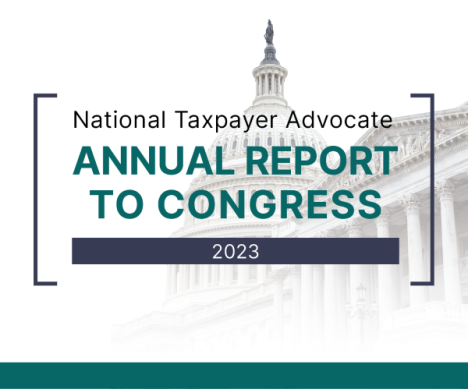2023 TAXPAYER ADVOCATE ANNUAL REPORT


If you weren’t frustrated and inconvenienced by inefficiency in responses by the IRS, certainly you know one or more taxpayers who have … or heard of the considerable backlog in unprocessed returns and unissued refunds for the past three tax years.
Erin Collins is our National Taxpayer Advocate. In her 2023 Annual Report to Congress she presented an assessment of progress in reducing known bottlenecks as well as identifying agency improvements that may take more time. Collins introduced her report with, “The year 2023 was one of extraordinary transition for the IRS and therefore for taxpayers. Despair has turned to cautious optimism. Because of the COVID-19 pandemic, the three preceding years had been the most challenging years the agency and most taxpayers had ever experienced.”
Progress Resolving Taxpayer Frustrations
As evidence of progress, Collins reported that the backlog of processing paper Forms 1040 “has been virtually eliminated” from a peak of 17 million returns at the end of 2021. Similar success remains to be realized with amended individual tax returns, business amended tax returns, or correspondence, the backlogs of which “remain at double their pre-pandemic levels.”
Wait times and answer rates of customer phone calls have been continuing frustrations for taxpayers. While more needs to be done, notably:
- During fiscal year 2021, roughly 11% of phone calls were answered.
- In contrast, 29% answered in fiscal 2023.
- Collins commended the IRS for reducing the average wait time from 29 minutes in fiscal 2022 to 13 minutes in fiscal 2023.
Collins emphasized that tackling the phone call issues had a ripple effect resulting in continued interruptions processing amended returns, taxpayer communications and delays in issuing refunds.
As stated in the report, “The IRS cannot easily shuffle employees back and forth between answering phones and processing correspondence, so unproductive employee time was the price it had to pay to improve telephone service levels”. Going forward, the IRS needs to find a way to move employees between those two functions more nimbly. For present purposes, however, we need to keep in mind that backlogs in processing tax returns and taxpayer correspondence drive much of the phone volume.”
Tax-related identify theft remains a major outstanding IRS service issue. Self-reported cases during fiscal 2023 averaged 19 months to resolve and taxpayers to receive amounts owed. At the end of that year, about 484,000 were unresolved and remain in inventory for processing.
So, two workforce issues were highlighted as requiring remedial attention.
- Collins urged the agency to address how open jobs are posted, expedite the pace of the hiring process, and make positions more competitive pay-wise.
- Shuffling staff between customer support work and inventory processing is that new hires tend to lack sufficient training to succeed, especially when speaking directly with taxpayers.
“The IRS has always had challenges with training, and those challenges are greater when the agency is staffing up”, she reported.
10 Most Serious Taxpayer Service Problems in 2023
The IRS requires the National Taxpayer Advocate to include a summary of the ten most serious problems encountered by taxpayers each year. Here is the list for 2023 based directly on an IRS survey about taxpayer attitudes and preferences. Click here to link with any for which you seek additional detail.
- Processing Delays
- Hiring, Recruitment & Training
- IRS Transparency
- Telephone & In-Person Service
- Return Preparer Oversight
- Identity Theft
- Online Account Access for Taxpayers & Tax
- International
- Compliance Challenges for Taxpayers Abroad
- Appeals
Summary
“After several difficult years for taxpayers, the IRS, and society in general, tax administration in 2023 mostly managed to leave its COVID-19 problems behind. The IRS eliminated most of its processing backlog, generally paid refunds timely, and answered taxpayer telephone calls at pre-pandemic levels. The good news is that, with limited exceptions, we are back to business as usual.”
“The bad news is that the baseline level of ‘business as usual’ was not good enough. Our nation’s taxpayers deserve a 21st century tax administration agency that is fair and equitable, provides timely and clear guidance, makes it possible for all taxpayers to electronically file their tax returns, answers its phones and resolves most issues at the first point of contact, and allows taxpayers to conduct business on any follow-up matters through online accounts in the same way they conduct business with their financial institutions.”
–ERIN M. COLLINS, NATIONAL TAXPAYER ADVOCATE

